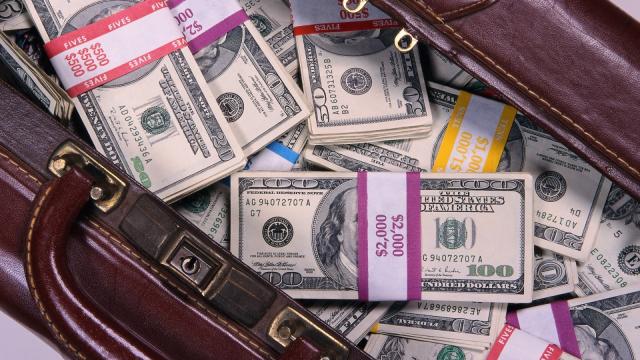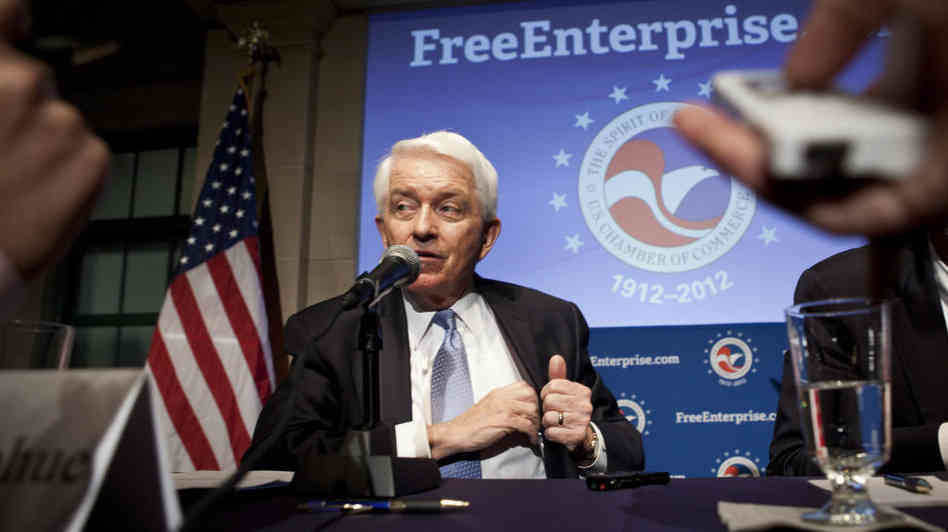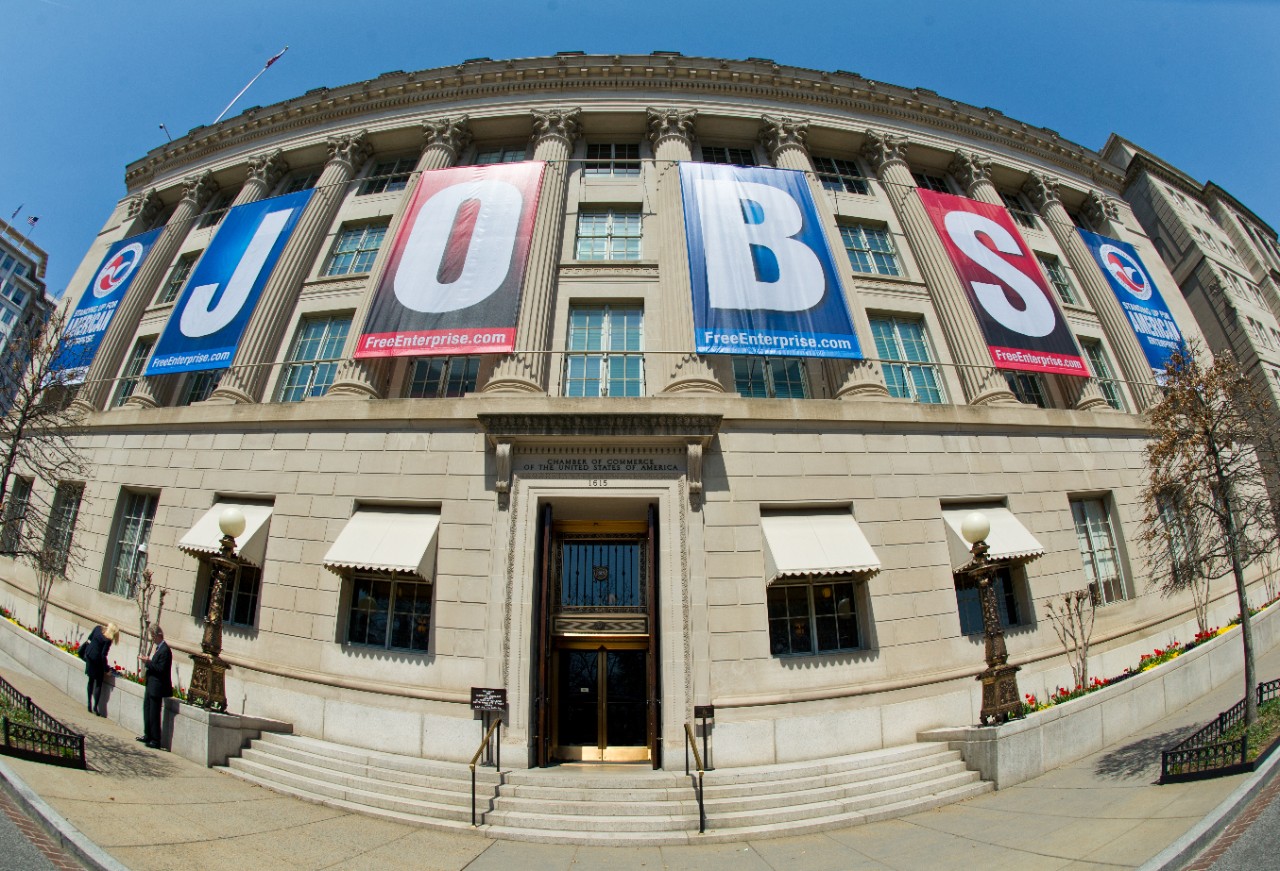
The following is an excerpt from Shut the Chamber's new 28-page report, "Bagful of Cash: How the U.S. Chamber of Commerce Orchestrated a Corporate Takeover of Government." My goal when writing the report was to publish a one-stop-shop for everything relating to the U.S. Chamber of Commerce's domination of all institutions of merit, from Congress to the courts, to the election cycles.
This report also shows how the U.S. Chamber has invested millions of corporate dollars into opposing all legislation relating to healthcare, financial reform, closing corporate tax loopholes, and climate change. The report also highlights the U.S. Chamber's support of austerity, fracking, the Keystone XL pipeline, and mostly Republican pro-corporate candidates running for Congress. You can read the full report at bit.ly/bagfulofcash.
Part III: The Corporate Takeover
"People seem to listen to you more when you've got a bagful of cash." - U.S. Chamber of Commerce President Tom Donohue, The New York Times
According to Donohue, the Chamber raises $5 million per week to keep its operations running. Most of this money, however, comes from billion-dollar corporations, not small businesses. The U.S. Chamber has spent $983 million on lobbying since 1998, and has already spent $16 million in 2013 according to the most recent quarterly reports.
The most recent bills opposed by Chamber lobbyists included the Paycheck Fairness Act, which would have secured financial parity between women and men in the workplace, and the Corporate Tax Fairness Act, which would have closed loopholes and exemptions often used by multinational corporations to avoid paying federal taxes on their U.S. profits. While ultimately unsuccessful, the Chamber did attempt to defeat a bill providing federal disaster relief to cities hit by Superstorm Sandy.
Roughly half of the U.S. Chamber's $140 million spent in 2008 came from just 45 anonymous donors. And in 2009, out of the whopping $150 million spent on lobbying, over half of that money came from the American Health Insurance Providers (AHIP), a lobbying group consisting of the top 5 biggest health insurers. The Chamber subsequently flooded airwaves with ads full of misleading statements about the Affordable Care Act, and sent armies of lobbyists to Congress to oppose the bill.
Even though health care reform still passed, the Chamber spent $33.8 million attacking supporters of the legislation in those respective congressional districts, leading to a takeover of the U.S. House of Representatives by corporate-funded candidates. The momentum created by the Chamber's furious opposition to the Affordable Care Act essentially created a Chamber-endorsed House majority that has voted to repeal the act nearly 40 times.
The U.S. Chamber brags about consistently ranking #1 in lobbyist spending for several years in the last decade. In 2012, the Chamber spent $139,000,000 on influencing congressional outcomes, as seen in figure 3.3. To compare, the two largest labor unions - the AFL-CIO and the SEIU - spent just under a combined $6 million last year.
The U.S. Chamber also spent considerable sums fighting the Dodd-Frank financial reform bill in 2009/2010, influencing Congress to vote down or neuter the bill, which was aimed at strengthening financial regulations to prevent a crisis similar to the 2008 housing collapse and subsequent bailouts of the nation's biggest banks.
The Chamber specifically came out with a laundry list of amendments aimed at removing all regulatory teeth from the bill, such as removing the derivatives regulations outlined in the Volcker Rule, leaving the leadership and budgeting of the Consumer Financial Protection Bureau to the mercy of a Congress which was largely installed with the help of the Chamber's financial support, and silencing Wall Street whistleblowers, among others. As recently as April 2013, Tom Donohue was on CNBC calling for the repeal of not-yet-written rules imposed on the financial institutions that decimated the world economy.
"Dodd-Frank was written in a hurry and it was written in anger. And here we are three years later ... We're already putting extraordinary stress on every kind of financial institution in this country." - U.S. Chamber President Tom Donohue
The U.S. Chamber of Commerce's most heavily lobbied bill was in 2010, when they threw their full weight behind the Stop Online Piracy Act, or SOPA. The bill would have allowed for global entertainment companies to censor any online content at their discretion. Despite the opposition to the bill on the part of many powerful Silicon Valley tech companies who were members of the U.S. Chamber, the group's lobbyists pushed hard for its passage.
The Chamber's vast lobbying efforts have, at least indirectly, led to the early 2013 explosion at the fertilizer plant in West, Texas, which killed dozens of first responders and leveled the surrounding community. A 2009 bill aimed at strengthening safety standards at chemical and fertilizer plants like the one in West was labeled a "key vote" by the Chamber that year, and the group mobilized on behalf of fertilizer companies to successfully defeat additional safety regulations. The bill was defeated in the House, and wasn't even brought up for a vote in the Senate. The Chamber has never publicly apologized for spending millions to defeat legislation that could have potentially saved the community of West from the explosion. Thanks to the continued support of decreased regulation, the West fertilizer plant has been inspected by the Occupational Safety and Health Administration just once since 1985.
U.S. Chamber CEO Tom Donohue has been one of the most outspoken proponents of austerity, and advocates regularly for the overhaul of Social Security and Medicare to become commoditized programs in which corporations can seize more profit. Tom Donohue's Chamber also backed President George W. Bush's plan to privatize Social Security in 2005. Combining the Chamber's support for Social Security privatization and support for deregulating financial institutions, it isn't hard to imagine a much more dismal scenario in the 2008 financial crisis if Social Security funds had been plundered along with the housing market bubble burst.
The other side of the U.S. Chamber's pro-austerity coin is its vehement defense of corporate tax avoidance. Even though 32 corporations dodged enough federal income taxes to pay for the entire education budget (approximately $72 billion), the Chamber of Commerce successfully lobbied to defeat the Corporate Tax Fairness Act, which would have closed enough tax loopholes to generate approximately $70 billion in additional tax revenue every year.
The contribution to federal tax revenues between payroll taxes paid by employees and income tax paid by corporations has flipped. From 1950-1960, corporations paid roughly $1.00 in income taxes to every $0.33 in payroll taxes paid by employees. Today, corporations are only paying approximately $0.07 cents in income tax to every $0.33 in payroll tax paid by employees. Essentially, the Chamber is using the budget gap to demand the gutting of earned benefits like Social Security and Medicare while lobbying to absolve its corporate members of its federal income tax obligations.
Tom Donohue has gone on record supporting the practice of hydraulic fracturing, also known as fracking, as have many of the Chamber's state affiliates. Despite well-documented risks to community drinking water supplies, the Chamber alleges that fracking provides jobs. While that may be true, the Chamber has lobbied to defeat bills aimed at investing in alternative, renewable energy sources proven to generate far more jobs.
The U.S. Chamber of Commerce has also used the jobs and domestic energy arguments in its support of theKeystone XL pipeline which would mine tar sands oil in Alberta, Canada, and pipe it 1,700 miles to Port Arthur, Texas. The pipeline's most optimistic predictions only credit it with creating 6,000 jobs over a two-year period, meaning 3,000 temporary jobs each year. And even though oil companies would get rich from the pipeline, none of the oil would actually be used in the U.S. as it has already been marked for export mostly to South American and European markets.
Current Chamber president Tom Donohue is on the board of directors for Union Pacific Railroad, which would be partially responsible for transporting tar sands oil by train to be refined in Texas should the Keystone XL pipeline never be built. Union Pacific has paid Donohue more than $1.1 million since 1998 in retainers, and it has donated over $700,000 to the U.S. Chamber of Commerce since 2004.
Despite repeated warnings from climate scientists like NASA's James Hansen, who said that tar sands oil would mean "game over for the climate," the Chamber has actually gone on record saying that climate change can be mitigated by humans adapting their anatomies to a warmer climate.
"Humans have become less susceptible to the effects of heat due to a combination of adaptations, particularly air conditioning. The availability of air conditioning is expected to continue to increase ... Populations can acclimatize to warmer climates via a range of behavioral, physiological and technological adaptations." - U.S. Chamber of Commerce comment to the EPA
In the John Roberts Supreme Court, the U.S. Chamber of Commerce has an overwhelming win rate of 70%, particularly in cases where it has first filed an amicus brief. During the duration of President Obama's first term, the Chamber was undefeated in Supreme Court rulings in which it was invested. The New York Times reported that the nation's highest court hasn't been this accommodating to major corporations since World War II, quietly stacking up small victories for them in a stream of 5-4 decisions.
The Chamber's lawyers successfully got the Supreme Court to make it harder for victims of corporate negligence to sue for damages, whether they are claimants in the BP oil spill or employees of corporations filing class-action lawsuits in cases of abuse. They recently ruled in favor of agribusiness giant Monsanto in a seed patent case against a farmer trying to save his seeds, ruling that Monsanto had the right to claim domain over the farmer's crops, since their genetically-modified seeds had cross-pollinated into the neighboring organic crops on the farmer's plot. Justice Clarence Thomas once worked as a corporate attorney for Monsanto. He did not recuse himself from the decision. He also didn't recuse himself when ruling against the constitutionality of the Affordable Care Act, despite his wife's having launched a lobbying group opposed to the Affordable Care Act's implementation.
Perhaps the most notable case of the U.S. Chamber of Commerce winning a Supreme Court ruling where an amicus brief was filed was in their support of the Citizens United v. FEC ruling in 2010. The Supreme Court's decision effectively reversed a century's worth of campaign laws, now allowing corporations to spend an unlimited amount of money from their vast treasuries on electioneering purposes. In the 2010 congressional midterm elections, 93% of the Chamber's contributions went to Republican candidates.
Of the remaining money spent on 11 Democrat candidates, they were on non-candidate specific ads. The Chamber exclusively funded Republican candidates for the U.S. Senate in 2010. Though they endorsed West Virginia Democrat Joe Manchin, they didn't spend any money on his behalf. In the 2012 elections, the Chamber pledged to spend $50 million (but reported $33 million), ranking 8th in total outside money spent. Of the 50 House and Senate races in which the Chamber had spent money to support or oppose candidates, they lost 36 races. Among groups that don't identify their donors, the Chamber ranked second behind the Koch Industries-backed Americans for Prosperity.
Attempts to roll back the effects of Citizens United v. FEC are met with fierce opposition from the U.S. Chamber of Commerce. While successfully lobbying to kill the DISCLOSE Act, which would have required groups spending money on elections to reveal their donors, the Chamber called the attempts to regulate corporate dominance of the election cycle an attack on free speech and democracy.
"What's most in need of disclosure is the real purpose behind this bill. It's nothing more than a brazen attempt to tilt the playing field in favor of the incumbent party in this fall's elections, silence constitutionally protected speech, and abridge First Amendment rights." - U.S. Chamber President Tom Donohue
The U.S. Chamber of Commerce is also a member of the American Legislative Exchange Council (ALEC), an organization that brings together corporate lobbyists with largely Republican state legislators. At annual ALEC retreats, lobbyists and legislators break off into task forces which collaboratively write "model bills" to maximize corporate profit. Model legislation aims to privatize public assets, lower corporate taxes, and repeal environmental regulations and workers' rights. The Chamber is a member of ALEC's Civil Justice Task Force, the Education Task Force, the International Relations Task Force, and the Telecommunications and Information Technology Task Force.
3 WAYS TO SHOW YOUR SUPPORT
- Log in to post comments













